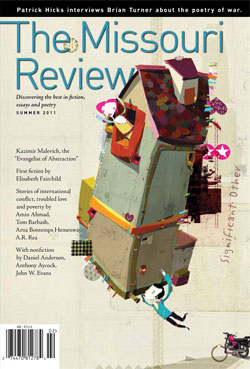Fiction | July 17, 2011
In the Mosque of Imam Alwani
Arna Bontemps Hemenway
This text is not currently available online.
This was when they lived in the eternal city. It seemed possible that the trio’s little corner of the Kurdish spring—the square chimneys of the brick kilns unfurling their listing columns of black smoke into the high, clear light, the sloped, red sides of the river, secreted within the ellipses of bank woods and seething with insects in the lambent dawn before the air filled with the clattering gossip of the washerwomen and the collisions of the silver-voiced children worrying its shallows—had, since the beginning of time, continued in just this way in its sounds and habits, relying on no allegiance other than the residents’ curious sense of belief in their own perpetuity. This was when Bajh and Asti and Araz all lived there together, when they were young and the fields and herds still seemed born entirely anew each spring; this was when it was still their city to have.
If you are a student, faculty member, or staff member at an institution whose library subscribes to Project Muse, you can read this piece and the full archives of the Missouri Review for free. Check this list to see if your library is a Project Muse subscriber.
Want to read more?
Subscribe TodaySEE THE ISSUE
SUGGESTED CONTENT

Editors' Prize Winner
Apr 16 2024
Invasive Species
Invasive Species We couldn’t decide between killing lionfish or common starlings. Harry voted for lionfish because spearfishing them would require a trip to Florida, a place on the map contrary… read more

Fiction
Apr 16 2024
The Regal Azul
The Regal Azul They were somewhere over the Atlantic, south of the Grand Bahama, but beyond that, Lang couldn’t say. This absurd cruise ship, outfitted with every form of entertainment… read more

Fiction
Apr 16 2024
Semicolon People
Semicolon People If I spent four years in medical school, I’d want people to address me as “Doctor,” so I call my new psychiatrist “Dr. Reagan” even though my friend… read more

